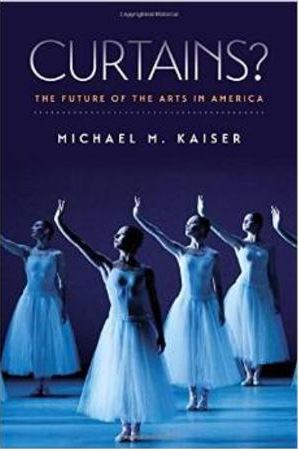Michael Kaiser’s New Book: Curtains?
 Michael Kaiser’s latest book, Curtains? The Future of the Arts in America, raises some difficult questions that arts organizations must face if they are to survive in this changing economy and culture. Mr. Kaiser, former President of the Kennedy Center and currently Chairman of the DeVos Institute of Arts Management at the University of Maryland, analyzes the current state of classical arts institutions: orchestras, opera companies, ballet and modern dance companies, and theaters. His assessment is not rosy.
Michael Kaiser’s latest book, Curtains? The Future of the Arts in America, raises some difficult questions that arts organizations must face if they are to survive in this changing economy and culture. Mr. Kaiser, former President of the Kennedy Center and currently Chairman of the DeVos Institute of Arts Management at the University of Maryland, analyzes the current state of classical arts institutions: orchestras, opera companies, ballet and modern dance companies, and theaters. His assessment is not rosy.
According to Kaiser, new developments in the twenty-first century, including the Internet explosion, the death of the recording industry, the near-death of subscriptions, economic instability, the focus on STEM education in schools, the introduction of movie-theater opera, the erosion of newspapers, the threat to serious arts criticism, and the aging of the donor base, have together created tremendous challenges for all arts organizations.
The Washington Post assessed his critique thusly: “Kaiser’s marketing ideas are commonsensical rather than groundbreaking: Develop a coherent strategy to focus the use of new technologies like e-mail and social media; sell the institution to donors as well as tickets to individuals; partner with public schools to provide the arts education that nurtures art appreciation.” He cites such new developments as opera in your local movie theater and sophisticated home entertainment centers as competing with live performances and experiences.
However, Mr. Kaiser also focuses on the necessity of having diverse and effective boards to accomplish the planning and leadership required today. According to Mr. Kaiser, “Many board members believe that if an arts organization were managed carefully, it would turn a profit. They cannot understand why an organization that makes something people like should run at a perpetual deficit… Such board members start from the belief that arts managers are doing something wrong. They think that if corporate managers could run the arts organization, then it would become profitable, that if arts managers were smarter, fund-raising targets could be lower. They are simply wrong.”
Quoting from Peter Dobrin’s review in the Philadelphia Inquirer, Mr. Kaiser illustrates the current situation thusly: “that subscribers now account for about 20 percent of ticket buyers, down from 60 percent to 70 percent three decades ago, and how this makes selling tickets more expensive and less predictable; that federal, state, and local funding for the arts fell 31 percent between 1992 and 2012; that, while corporations once gave to be perceived as good citizens, they now want measurable returns; that in January 2014, the top-selling classical album, by violinist Hilary Hahn, was the best seller by virtue of having sold a miserable 341 copies.”
Mr. Kaiser’s assessment is that, unless arts organizations become very creative, only the largest will survive – those that can afford the cost of high technology to bring their art form to the public in new and very expensive ways. “Little by little,” Kaiser concludes, “we will witness an erosion of the scope and diversity of the arts.”
Jeffrey Brown of PBS’ News Hour interviewed Michael Kaiser recently; it’s quite interesting to hear Mr. Kaiser present his views. You can listen here.


No comments yet.
Add your comment